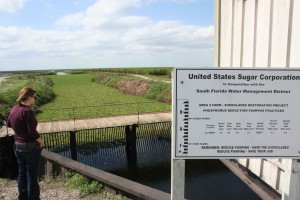Anyone interested in the environment couldn’t be blamed for skipping Tuesday’s opening session of the Legislature. But the week ended with a bang.
Gov. Rick Scott’s “state of the state” speech on Tuesday contained no reference to the environment, energy or growth management. (See “Scott sounds re-election themes as 2013 session opens,” by The Florida Current.)
Likewise, House Speaker Will Weatherford skipped those topics in his opening speech to the House. Senate President Don Gaetz skipped even giving his own speech.
In their Democratic responses, Sen. Chris Smith said the environment made Florida No. 1 and deserves protection. Rep. Perry Thurston said Scott has the wrong priorities for water and land use. But those environmental references were just made in passing.
There was plenty of other action on the environment, though most of it came later in the week.
On Monday, Rep. Steve Crisafulli, R-Merritt Island, was designated House speaker in 2014, if Republicans maintain their majority. As former chairman of the House Agriculture & Natural Resources Subcommittee, he will bring a knowledge of environmental issues laced with some skepticism from his agricultural background. (See “Crisafulli tapped by House caucus as GOP designate,” by The Florida Current.)
Also Monday, the Florida Current profiled Florida Water Advocates, a group with utility and corporate ties that is urging the Legislature to spend more on water supply. But “Blue Revolution” author Cynthia Barnett, who was interviewed here last week, said Florida could meet its future water needs through conservation.
Rep. Clay Ford, chairman of the House Energy & Utilities Subcommittee, missed opening day because of ongoing health issues and missed two previous committee meetings. (See “Rep. Clay Ford, energy subcommittee chairman, misses meetings amid health concerns,” by The Florida Current.)
While Rep. Michelle Rehwinkel Vasilinda joined other committee members in voicing concerns about Ford, she also expressed concern about turnover on the committee’s chairmanship.
A bill that supporters say would encourage the development of natural gas refueling stations passed the subcommittee on Tuesday without opposition. But the Florida Current story touched off comments among readers over whether government should be trying to encourage new sources of energy.
The real action this week came late Tuesday when the House State Affairs Committee filed a proposed committee bill dealing with Everglades restoration. (See “House committee bill on Everglades condemned by environmental groups,” by The Florida Current.)
Audubon Florida led a massive push by environmental groups to turn out opposition to the bill.
 On Thursday, the committee voted to file the bill over the objections of environmental groups who said sugar farmers need to pay more of Gov. Rick Scott’s $880 million restoration plan, approved by federal agencies in 2012. (See “House committee rejects environmental opposition, votes to file Everglades bill,” by The Florida Current.)
On Thursday, the committee voted to file the bill over the objections of environmental groups who said sugar farmers need to pay more of Gov. Rick Scott’s $880 million restoration plan, approved by federal agencies in 2012. (See “House committee rejects environmental opposition, votes to file Everglades bill,” by The Florida Current.)
Also Thursday, the Senate Environmental Preservation and Conservation Committee approved SB 948 dealing with agricultural water supply. The bill has only one more committee stop. (See “Ag water bill passes Senate committee while coal ash and fracking bills clear House subcommittee,” by The Florida Current.)
The bill would put agriculture on par with utilities in planning for the state’s future water supply. But Sierra Club Florida and Audubon Florida raised concerns that the agriculture needs will get priority over the environment during dry times.
In the House, the Agriculture & Natural Resources Subcommittee approved HB 743, which would create a registry for chemicals involved in hydraulic fracturing, or fracking.
Rep. Ray Rodrigues said interest in fracking in Southwest Florida prompted the legislation. Environmental groups have not taken a stand on the bill, and subcommittee members praised Rodrigues for being forward-looking.
HB 659 also passed the subcommittee with opposition from Sierra Club Florida, Audubon Florida and Clean Water Action. The bill would exempt coal ash from being classified as a banned hazardous waste in the state.
(Story and photos copyrighted by Bruce Ritchie and Floridaenvironments.com. Do not copy or forward without permission, which can be obtained from brucebritchie@gmail.com).

